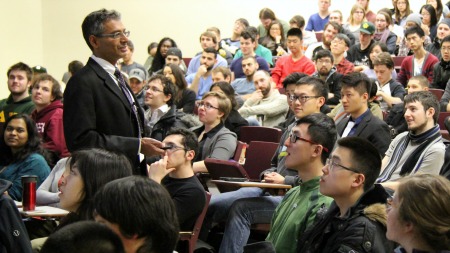
TECH ENTREPRENEUR: Hemi Thaker connects with senior engineering students prior to the Cheriton Lecture.
(Edmonton) A University of Alberta computer engineering alumnus-turned-tech mogul delivered equal measures of practical entrepreneurial advice and inspiration at the Ross and Muriel Cheriton Distinguished Visitor Lecture on January 26.
Hemi Thacker, who earned his computer engineering degree at the U of A in 1986 and his master's degree at the University of Waterloo in 1988, recounted his education and entrepreneurial career in a talk entitled "How We Built and Multi-Million-Dollar High-Tech Company."
Thaker describes his experience leading four high-tech starts ups in modest terms: "I've started four companies and had two successful failures." He addressed the crowd of about 150 students and academics at the talk-sponsored jointly by the Faculty of Engineering and the Alberta School of Business.
"What is a successful failure? Well I failed, first of all. That's easy to define but the 'successful' part is that you learn from your mistakes," he said "An unsuccessful failure is when you don't learn from your mistakes."
Calling himself a proud engineer and "an accidental entrepreneur," Thaker described his first startup failure, a hand-held calorie counter, as "neat engineering" that never took off. "We were afraid of our own shadows-we didn't share our vision or our product. And I learned from that."
His next company, CAD Tools, was software that helped people manufacture integrated circuits. But he was only committed to the company part time and "it was too easy to let it go when things got tough."
Next he worked at Northern Telecom's research and development arm, where he developed highly specialized-and valuable-technical skills. He had become one of only about 50 people in the world capable of designing pointer processors that allowed computers to synchronize their clocks. This skill was as vital as it was rare in the early days of the Internet, so he headed out on his own again.
"I took a calculated risk," he recalled. "I was the right person in the right place at the right time." Sybarus Systems, the company he started with just $8,000, was sold to Lucent Technologies in 1999 for $56 million.
His next firm, Anue Systems, is a textbook illustration of corporate nimbleness. Anue Systems started developing systems to monitor and test complicated physical and virtual networks. It refocused on the specialized in monitoring side after Thaker and his team identified a huge customer need. They created Anue with $20,000 and sold it in 2012 to Iaxia for $154 million.
"You've got to pivot many, many times before you're going to be successful," he said. "It took a team of people who were smart and creative to create a business that could make it to that stage."
Accolades have come with his entrepreneurial achievements. He is an Inc 500 CEO and a recipient of the Ernst & Young Entrepreneur of the Year Award for Central Texas in 2011. But he said he's most proud of the fact that he is an engineer. His 17 patents attest to his that skill and creativity.
Thanker also addressed two 400-student lectures for fourth-year engineering, sharing his career story-and inspiring them to make a difference in the world. He carried that message into the Cheriton Lecture as well, highlighting his involvement as a co-founder of Waterloo Springs, a non-profit dedicated to creating self-sustaining ecosystems to continually better the lives of people in need using frugal engineering and design thinking. The Waterloo Springs team has designed, implemented and put into field trials a water transportation device drawing on "Build-Measure-Learn" principles to solve water access problems in developing countries. The team is having success in parts of Ethiopia, for example, making family and personal water transportation easier through creative and sustainable engineering.
Thaker said he's grateful for his U of A engineering education. "I have a lot of friends who went to MIT or Harvard or Stanford," he says. "A University of Alberta education stands among the best. Students graduating from here are well prepared to solve the problems of the world."